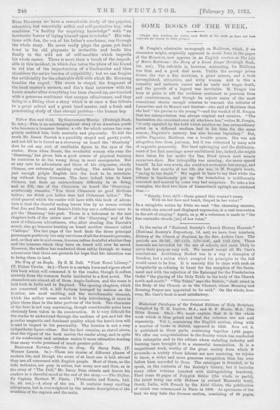SOME BOOKS OF THE WEEK.
(Under Otis heading we 11o/ice such Books of the week as hare not boon resertint for review in other forntel M, Pougin's admirable monograph on Malibran, which, if we remember aright, originally appeared in serial form in the pages of the Menastrel, now appears in an English version as The Life of Maria Malibran : the Story of a Great Singer (Eveleigh Nash, 10s. net). The sub-title is, however, misleading, for Malibran was that and a good deal more. Unlike the average prima donna, she was a fine musician, a great actress, and a most accomplished, attractive, and witty woman. Add to this a romantic and meteoric career and an early and tragic death, and the growth of a legend was inevitable. M. Pougin has been at pains to sift the evidence contained in previous lives and reminiscences, and though be rejects many of the most sensational stories enough remains to warrant the tributes of Lamartine and do Musset and Gautier—who said of Malibran that she had "the genius to die young "—and the verdict of M. Pougin that her interpretation was always original and creative. "The fascination she exercised over all who knew her," writes M. Pougin, "is only equalled by the hold which another no less extraordinary artist in a different medium had in his time for the same reason ; Paganini's memory has also become legendary." But unlike Paganiui, Malibran was a lovable person. She was not altogether free from jealousy, but it was redeemed by many act. of exquisite generosity. Her hard upbringing and the disillusion- ment of her first marriage never embittered her; indeed, she might have taken for her motto the line, Halal ignara mali miseris succurrere disco. Her intrepidity was amazing : she never spared herself. In her own words, she could not economize her energy, and the last few months of her life she was, in M. Pougin's words, "racing to her death." We regret to have to say that while the volume is handsomely got up the translation is indifferently executed and marred by some very bad misprints. To take a few examples, the first two lines of Lamartine'e epitaph are rendered thus :— "Beauty, love, shill—these graced this woman's name, Writ on her face and heart, limped in her voice!"
In a eulogistic notice by Ma we read "the charming manner, in which she minced and displayed expression, is a real innovation in the art of singing." Again, on p. 49 a reference is made to "the fine contralto chords [sic] of her voice."










































 Previous page
Previous page